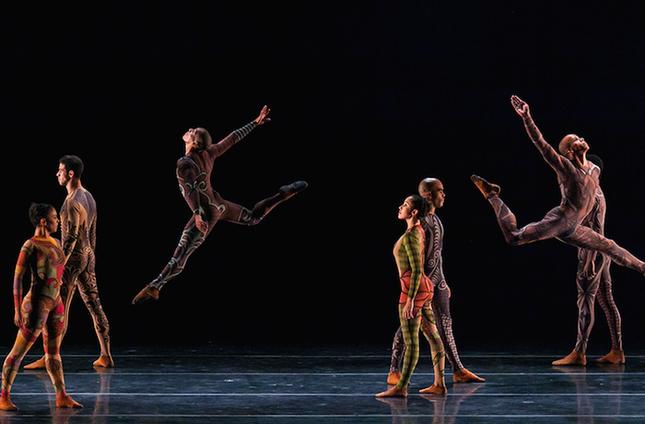Dazzling, Dizzying Iberian Festival Opens at the Kennedy Center
By • March 19, 2015 0 846

If you’re one of those people who drop by occasionally by plan, or just come as a tourist, the Kennedy Center often offers surprises of the sort that are both dazzling and a little dizzying.
That was the case on a cold and wet night when the center opened “Iberian Suite: global arts remix,” another one in a series of international festivals held yearly by the folks at the center, displaying to often wondrous effect the arts, culture, music, fashion, food, theater and dance arts of a particular region or country.
“Iberian Suite” is a vast, nearly month-long festival of the arts and many other things, focusing on the world-wide cultural offerings of Spain and Portugal, and how, Iberian explorers and artists had affected and influenced the rest of the world including the Americas, the Middle East, Africa and Asia, but had been in turn influenced by other cultures including those they encountered in their explorations.
If you just happened by on opening night or were there for the festival opening at the Eisenhower Theater, you could be forgiven if you ended up a little disoriented and pleased all at the same time. Right there in the nearly full length of the Hall of States, you were confronted with a spectacular fashion exhibition that told the story through a very cool display showing how the blue porcelain trade influenced fashion to this day, with works by Portuguese, Brazilian and Spanish designers.
While casual visitors as well as ticket-holders gawked at the mannequins decked out in 50 shades of blue, Kennedy Center President Deborah Rutter greeted guests for a 400-people, sit-down dinner who were also attending the opening performance. Tourists mingled more or less with black tie Spanish and Portuguese officials and diplomats, mixed in with critics, a senator (Tim Kaine, Democrat from Virginia) and media types. The former King of Spain – the dignified, regal and tall Juan Carlos – was also in attendance at the performance.
The performance itself was one of those events that is designed to make you salivate for the whole ball of festival wax. The evening also gave you sense of the powerful palate of Iberian visuals (a big exhibition of Pablo Picasso ceramics has been installed upstairs) and performance arts.
There were national and international treasures on stages, complete with a narrated story, film and video clips (including a to-be-treasured video of cello master Pablo Casals in concert at the White House watched over by Jack and Jackie Kennedy). Casals’s widow, Marta Casals Istomin, was in attendance.
Casals was present, with remembered honor, and a performance by the intense international cellist, Amit Pellet, holding and playing Casals’s very own cello, was like a living artifact.
Iberian styles of music and performers and singers were on hand, conducting a highlight lesson in range. There was the powerfully emotive Mexican legend Eugenia Leon—dubbed the soul of Mexico—who sang with great passion and a kind of supernatural royalty. Fado, Portugal’s brand of soul music, was exemplified by Carminho (aka Carmo Rebelo de Andrade), who was a sleek onstage presence, sliding easily between the deeper aspects of Fado into pop.
Periodically, you heard the voices and saw videos of the imagery of writers and poets—the Nobel Prize-winning Chilean poet Pablo Neruda, Jorge Armado of “Donna Flora and Her Two Husbands” fame and others. The language and the voices rose rich as a memory of landscapes locked securely in the mind.
Groupo Corpo, a vivid, tony and relentlessly beautiful and energetic dance troupe from the Brazilian state of Minas Gerais wowed the audience with a perpetual motion dance coat of many colors.
If you wanted a historic moment, you got one when it was announced that the Spanish dancer Angel Corella, a principal dancer at the American Ballet Theater, a native of Madrid and now the artistic director of the Pennsylvania Ballet, would be retiring and making his last public appearance. It was a little hard to believe that the 40-year-old Corella was ready to be retired or retiring—he and his beautiful sister Carmen Corella dance with power and grace, spinning, springing across the stage. That was some moment, with a little boy delivering flowers to both.
The finale offered everyone who had performed a chance to sing together, gathered around like a bouquet that launched into “The Impossible Dream,” from “Man of La Mancha,” an eternal Broadway hit show about the great Spanish literary giant Miguel Cervantes and his creation Don Quixote.
It was a Kennedy Center night, the rhythms of the world, moving musically and physically back and forth from Portugal and Spain around the world and back again. In the hall earlier, designers and women in sleek black patron dresses mingled among the blue dresses, taking selfies. Rumor has it that the King of Spain did, too.

